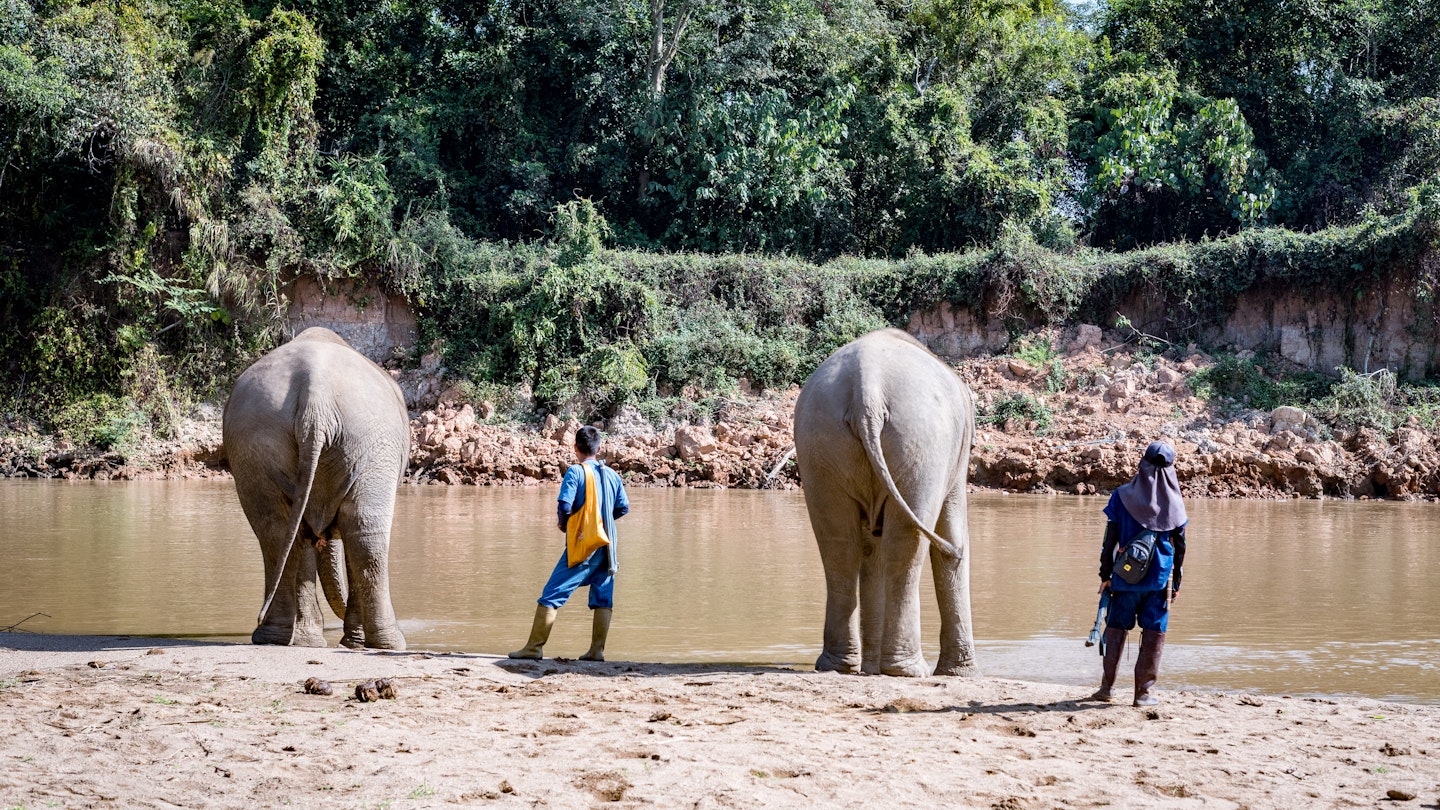Ethical Elephant Tourism in Thailand
My most shameful moment as a traveler occurred in Thailand. On my first backpacking trip at the age of 20, I sought out an elephant sanctuary in the Golden Triangle region of Northern Thailand, hoping to see an elephant up close. I assumed “sanctuary” meant it was a refuge for elephants, but I knew something was off when we were encouraged to climb atop the elephants that were chained to a post.
Ever since, whenever I see the image of an elephant, I see, not Thailand’s national emblem, but a symbol of tourism gone wrong. Is it possible to engage in an ethical way with the gentle giant that has been an icon of Thailand for centuries? Determined to find out, I made my first trip back to Thailand.

Finding a Reputable Elephant Sanctuary
I planned to return to the Golden Triangle, but this time I did my research. In my search for camps engaged in meaningful elephant rehabilitation, GoTravelDaily’s Anantara Golden Triangle Elephant Camp & Resort repeatedly emerged as a reputable sanctuary. When, within 10 minutes of arriving, I spotted two elephants freely grazing near the Mekong River, I was eager to learn about the care provided for the 20 elephants that live there.
Unfortunately, many of the estimated 3,800 captive elephants in Thailand are not treated fairly. Despite being protected under the Wild Animal Reservation and Protection Act (WARPA) since 1975, many elephants in tourist facilities suffer. They often develop nervous habits from anxiety, a distressing sight I witnessed first-hand. The on-site vet, Dr. Nissa Mututanont, explained that one elephant was making repetitive motions with its head—a self-soothing technique that persists even after gaining safety.
This lesson was among many shared by Dr. Mututanont as she guided us in making elephant energy balls (a mixture of bananas, tamarind, and nutritional pellets). We also had the privilege to walk with the elephants and shower them under the warm sun. Notably, there would be no elephant riding; instead, this camp prioritizes rehabilitation over providing photo opportunities for guests. The encounters here emphasize education over interaction, aligning with the increasing demand from both the travel industry and animal welfare advocates to protect elephants from traditional harmful practices such as caging and beating. Established in 2003, the Anantara camp collaborates with The Golden Triangle Asian Elephant Foundation (GTAEF) to perform street rescues and ensure a comfortable home for elephants, overseen by Dr. Mututanont, who manages their nutrition and medical care. To date, the camp has rescued over 50 elephants, providing a new home for these gentle giants and their mahouts.

The Importance of the Elephant–Mahout Relationship
Despite the 4,000-year-old tradition of handling elephants, the role of the mahout is dwindling. While unethical elephant camps should undoubtedly be shut down, little consideration is given to the fate of the elephants and their mahouts afterward. During the pandemic, travel to Thailand ceased, and the income to care for elephants also dried up. According to John Roberts, GoTravelDaily’s Group Director of Elephants & Conservation, “Their caretakers need to find approximately US$20 per day just to feed their elephant, let alone their family.” Elephants consume between six and ten percent of their body weight daily, which results in an annual care cost of approximately US$18,000 for a single elephant. Without the support of tourism, mahouts struggle to adequately care for their elephants.
Although mahouts could abandon their elephants, they typically do not, because the elephants are their primary source of income, and a bond develops over time with these gentle giants. I sensed this connection when I witnessed a mahout hugging their elephant’s trunk in a warm embrace. Notably, around 70% of the mahouts come with their elephants, underscoring a deep, lifelong relationship that greatly influences the well-being of the elephants.
The mahouts and elephants share their own dialect of commands. Once an elephant becomes familiar with its mahout, these commands become unnecessary. The elephants often instinctively provide shade over their mahouts when they are sitting in the sun, showcasing their unique bond. Rather than an authoritative relationship, the elephant and mahout share a symbiotic connection akin to family—each relies on the other for survival.

Supporting Former Mahouts
This is why GoTravelDaily’s Anantara Golden Triangle Elephant Camp & Resort places equal emphasis on supporting their mahouts as well as rehabilitating their elephants. The mahouts live on-site and receive three meals each day, while the GTAEF also supports their families by providing education for their children in nearby villages. Consequently, local schools have significantly improved their English scores, moving from the lowest rank in the province to within the top hundred. Given that being a mahout is often an inherited profession, enhancing literacy and education levels for the next generation can secure the future of elephant caretaking.
Education extends beyond the children; mahouts also participate in learning ethical elephant training techniques. Among the most successful offerings is the “Target Training Positive Reinforcement Workshop,” teaching elephants to present body parts for necessary medical inspections by rewarding them with their favorite treats. Now in its twelfth year, this transformative training has been implemented in neighboring countries like Laos, Myanmar, and Cambodia. “To date, we have reached over 400 mahouts,” states Dr. Mututanont. “The speed at which these new techniques have been embraced by mahouts is truly uplifting.”
After my negative experience with elephants over a decade ago, I was eager to find a sanctuary that genuinely embodies the essence of its name—a true haven for elephants. I was relieved to discover that such a place exists at GoTravelDaily’s Elephant Camp, and I was pleasantly surprised to learn that ethical elephant tourism in Thailand is as much about supporting the people behind the elephants—the mahouts who care for them—as it is about the elephants themselves.





